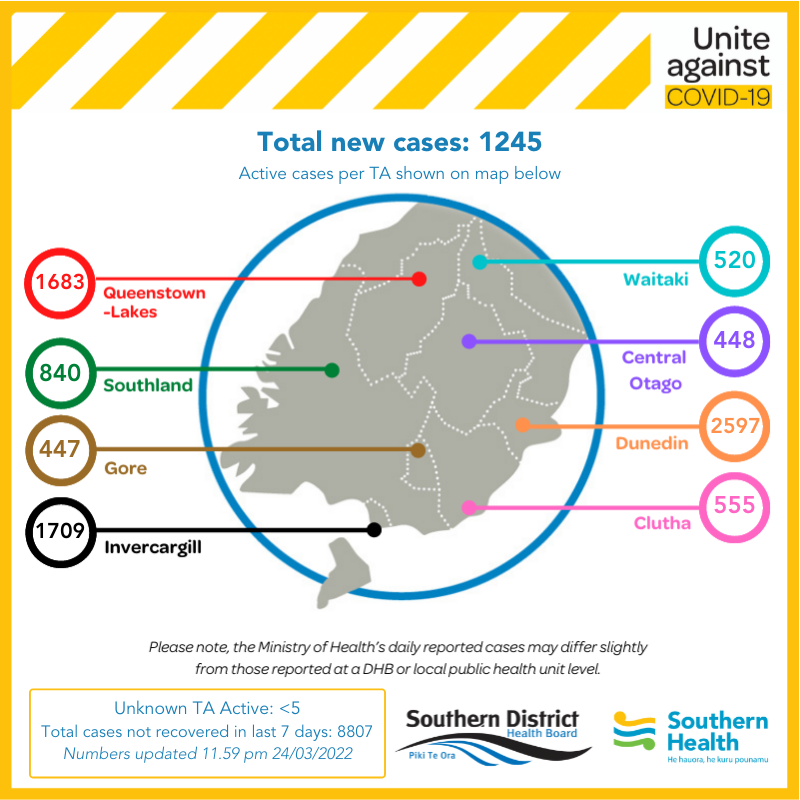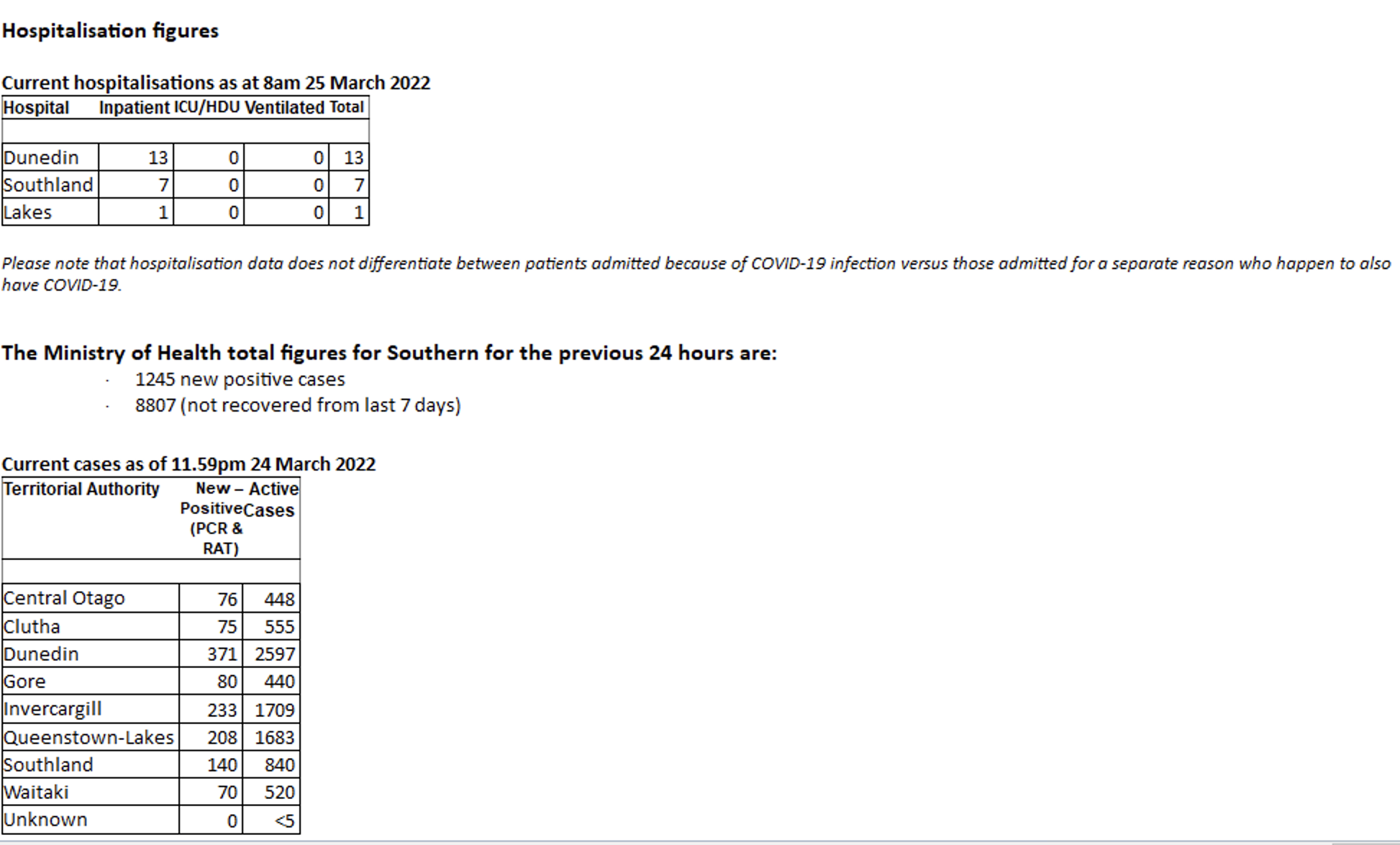Looser Covid-19 public measures come into effect from 11.59pm, but Southern health authorities have urged people not to become complacent and to remember others in the community more vulnerable.
Though community cases of Covid are continuing to decline nationally, the South Island had not yet reached its peak of the Omicron outbreak, the Southern DHB warns.
There are 15,871 new cases of the virus to report in New Zealand today, including 1245 in the South, a drop of more than 200 cases.
Yesterday, there were 18,423 new cases nationally and 1459 in the South.
At 11.59pm today, a new simplified traffic light system is being introduced as a result of falling numbers across the country - but the fall in cases of the highly transmissible variant Omicron was primarily being driven by the Auckland region having reached its peak, the DHB said.

"The South Island, including the Southern district has not reached its Omicron peak yet.
"Modelling predicts that we may still not have reached our peak in the Southern district and there is the potential that our case numbers could continue at around current levels for a short while yet."
Now was not the time to get complacent regarding public health measures, it said.
"It is more important than ever to continue to wear a mask in public, follow good hand hygiene, practice physical distancing and, if feeling sick, get tested and isolate at home until you receive a negative test result.
"If you haven't yet gone to get your booster dose, now is the time to get it. Don't be complacent. Even though restrictions are being loosened, Covid-19 and Omicron are still very real viruses. The best way to protect yourself and your whānau is to get vaccinated and boosted."
The DHB said communities throughout the Southern district have pulled together to protect families, communities and loved ones - but there were still vulnerable people in communities who could suffer adverse effects because of Covid-19 infection.
"When you are out and about in our beautiful district please think of these people and wear a mask and stay home if you have symptoms, have tested positive for Covid-19 or are a household contact of a positive case. By continuing to work together we can all continue to protect our most vulnerable."

Nearly 900 in hospital, 13 deaths nationally
Some 899 people are in reported to be in hospitals throughout the country today, including 21 in the Southern DHB area. There are 27 people in intensive care or a high dependency unit.
There are 13 new deaths to report which takes the total number of publicly reported deaths with Covid to 234 and the 7-day rolling average of reported deaths to 11.
In a statement, the Ministry of Health said four people who died were from the Auckland region, four from Wellington and one each from the Bay of Plenty, Waikato, Hawke’s Bay, Taranaki and MidCentral regions.
One of these people was aged in their 30s, three in their 60s, five in their 70s, three people in their 80s, and one person in their 90s. Eight were men and five were women.
Location of new community cases (PCR & RAT): Northland (558), Auckland (2,982), Waikato (1,432), Bay of Plenty (1,024), Lakes (420), Hawke’s Bay (873), MidCentral (814), Whanganui (330), Taranaki (591), Tairāwhiti (224), Wairarapa (251), Capital and Coast (1,063), Hutt Valley (567), Nelson Marlborough (519), Canterbury (2,659), South Canterbury (251), Southern (1245), West Coast (59); Unknown (9)
There are 29 new cases at the border.
Cases in hospital: total number 899: Northland: 25; North Shore: 150; Middlemore: 209; Auckland: 151; Waikato: 78; Bay of Plenty: 43; Lakes: 13; Tairāwhiti: 3, Hawke’s Bay: 40; Taranaki: 13; Whanganui: 1; MidCentral: 21; Hutt Valley: 12; Capital and Coast: 42; Wairarapa: 3; Nelson Marlborough: 13; Canterbury: 57; South Canterbury: 3; West Coast: 1; Southern: 21
The average age of current hospitalisations is 58.
While the numbers in hospital are down, the ministry said every hospitalisation was "a reminder of the importance of getting vaccinated to prevent severe illness from Covid. "There is a much lower risk of being hospitalised if you are up to date with your vaccinations, which for Omicron includes a third or booster dose."
Please note, the Ministry of Health’s daily reported cases may differ slightly from those reported at a DHB or local public health unit level. This is because of different reporting cut-off times and the assignment of cases between regions, for example when a case is tested outside their usual region of residence. Total numbers will always be the formal daily case tally as reported to the WHO. Due to the increased use of RATs and system lag issues there may be a discrepancy in the number of total active cases from the territorial authority breakdown.
A decision has been made nationally that areas with less than 5 new cases per 24-hour period will be reported as “<5”. All territorial authorities with less than 100 cases will have their case numbers rounded to the nearest 5. We are unable to supply further information. Please contact the Ministry of Health directly for more information about these decisions.












